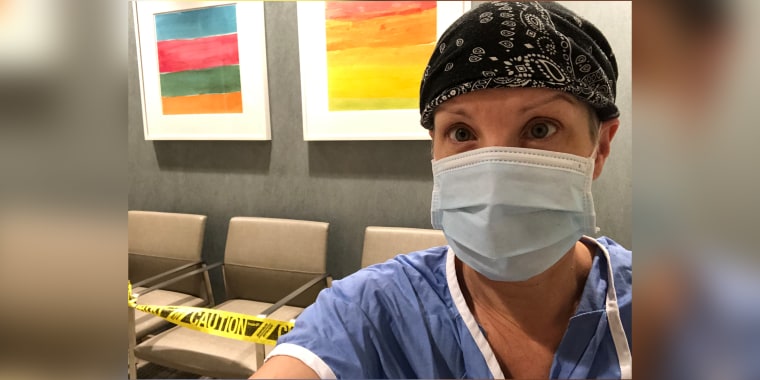I got within a few inches of a stranger today. It was not an accident, but it was by no means a disregard for social distancing. I would have given anything to be back in the safety and coronavirus-free confines of my home, like I have been for almost two weeks, but today, I had to treat my cancer.
I am starting radiation. This phase of my treatment has already been delayed because of the global pandemic. It’s also the treatment I have most been looking forward to because it is the last one. Shortly after my breast cancer diagnosis last September, I began four months of chemotherapy. Early this year, I had my surgery. All things considered, I was feeling pretty good. I pictured myself sailing through radiation, with an eye on remission and a full return to my life. Then came COVID-19.
Download the TODAY app for the latest coverage on the coronavirus outbreak.
As I entered the hospital this morning, I couldn’t help but feel alone. When I started chemotherapy, my husband held my hand. When I woke up from surgery, he was the first thing I saw, but that was before every extra person in a facility brought the threat of coronavirus. Visitors are now banned, except for those at the end of life, or for children, who can have just one parent at their side.
As I approached the building, a security guard stayed six feet away as he opened the door for me. Inside, I was asked questions I would answer over and over through the appointment. No, I had not been in direct contact with anyone who has tested positive. No, I wasn’t showing any symptoms. Almost everyone was wearing a mask. Where in the past, I could count on a friendly and reassuring smile as I headed into an appointment, today they were all covered. By the look in everyone’s eyes, there probably weren’t many smiles underneath anyway. One patient eyed me downright fearfully and seemed to cower. I realized she couldn’t get past with a 6-foot berth, so I stepped aside. I could see her relief. “Sorry,” she said. It was OK. I understood.
As a cancer patient, you get used to practicing careful hygiene, but today, everything I saw seemed like a threat. Which chair might hold coronavirus droplets? Had somebody coughed in the changing room before me? After weeks of careful isolation, what might I now be bringing home to my family? I put my clothes in the locker, but didn’t bother to touch the key. In the waiting room, most of the chairs were roped off with caution tape. It was meant to avoid anyone sitting too close together. I tried not to compare it to a crime scene, then sanitized my hands again.
When we hear about "vulnerable populations," cancer patients usually appear pretty high on the list. Somehow, it still gives me pause when I realize I’m in that group. As if a cancer diagnosis isn’t enough, now we have to worry about COVID-19? Don’t get me wrong. I’m one of the lucky ones. In the months since chemotherapy, my blood counts have recovered. Radiation can still tax your immune system, but I cannot imagine being in the midst of an immune-blasting chemo right know.
As I wait for my appointment, I think of those just starting treatment, or maybe worse, those who now cannot get it. Last week, I interviewed a woman with stage IV colon cancer who had her last hope, an immunotherapy trial, delayed because of the pandemic. She has a 2-year-old. We laughed that when this was all over we would get our kids together for a play date, but her doctor has told her she may not live that long. Coronavirus can threaten lives, even in those who never catch it.
In the treatment room, the technicians lean over me. They are CLOSE, lining me up in the exact position needed for the radiation beams. For the treatment, every millimeter matters, but this is closer than I’ve been to anyone but my family in weeks. Make no mistake, behind their protective gear, I’m sure they are looking at me and wondering if I’m the one who will infect them. I wonder how all of us will stay virus-free, as I will do this five days a week for the next five weeks.
As I lie there, the giant machine whirring around me, I catch my reflection. A green crosshair lights up across my chest. My eyes begin to well with tears at the symbolism, and then, I hear a voice, “I’m with you in the room. Keep doing what you’re doing.”
As they make more adjustments, I realize I’m not alone, after all. There are health care workers across the country working through this at their own peril to make sure people get the care they need. There are the other patients, continuing to fight, determined to survive. Finally, there are the millions holed up at home, doing all they can to slow the spread, so that all of us might make it through. I can only say thank you. We really are all in this together, and that’s what I’ll hold on to for the next five weeks.

